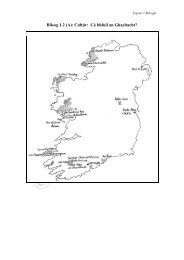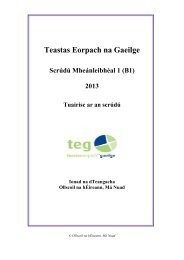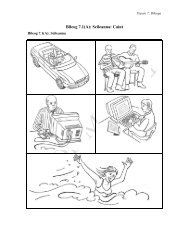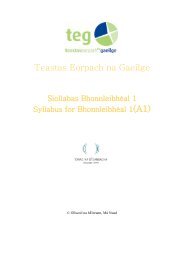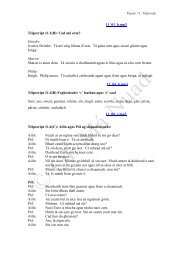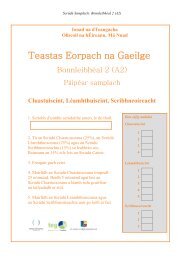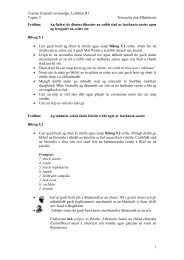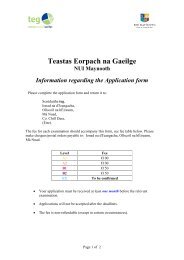You also want an ePaper? Increase the reach of your titles
YUMPU automatically turns print PDFs into web optimized ePapers that Google loves.
When speaking:<br />
Syllabus A2<br />
• Planning ahead: for example, that the learner would have a store of basic<br />
phrases. (S)he will usually be able to recall a suitable phrase and use it as<br />
required.<br />
• Compensating in the event of the learner lacking specific vocabulary.<br />
Seeking help with regard to a specific word/phrase/point:<br />
Cén Ghaeilge atá air…? (What is the Irish for…?)<br />
Conas a deirtear…? (How does one say…?)<br />
• Questioning others to see if they have understood what has been said.<br />
An dtuigeann tú sin? (Do you understand that?)<br />
• Monitoring progress<br />
- Questioning another/others to determine if what the learner has said<br />
is correct<br />
An bhfuil sin ceart? (Is that correct?)<br />
- Noticing when they have made mistakes and engaging in self-correction.<br />
- Noticing persistent problems which they may have and attempting<br />
to correct them.<br />
When listening:<br />
• Expressing the fact that the learner does not understand something:<br />
Tá brón orm. Ní thuigim sin. (I’m sorry. I don’t understand<br />
that.)<br />
Gabh mo leithscéal, ach ní thuigim sin. (Excuse me, but I don’t<br />
understand that.)<br />
• Seeking clarification:<br />
Cad é a chiallaíonn…? (What is the meaning of…?)<br />
An bhféadfá é sin a mhíniú dom, le do thoil? (Could you explain that<br />
to me, please?)<br />
• Requesting that the interlocutor repeats what he/she has said:<br />
Arís, le do thoil. (Could you repeat, please?)<br />
• Seeking confirmation that the learner has understood what has been said:<br />
An é an Fhraincis a dúirt tú? (Did you say French?)<br />
• Asking the interlocutor to speak more slowly:<br />
An bhféadfá labhairt níos moille, le do thoil? (Could you speak more<br />
slowly, please?)<br />
• Using the context to guess the meaning of words or phrases which the learner<br />
doesn’t understand.<br />
© National University of Ireland, Maynooth 6




